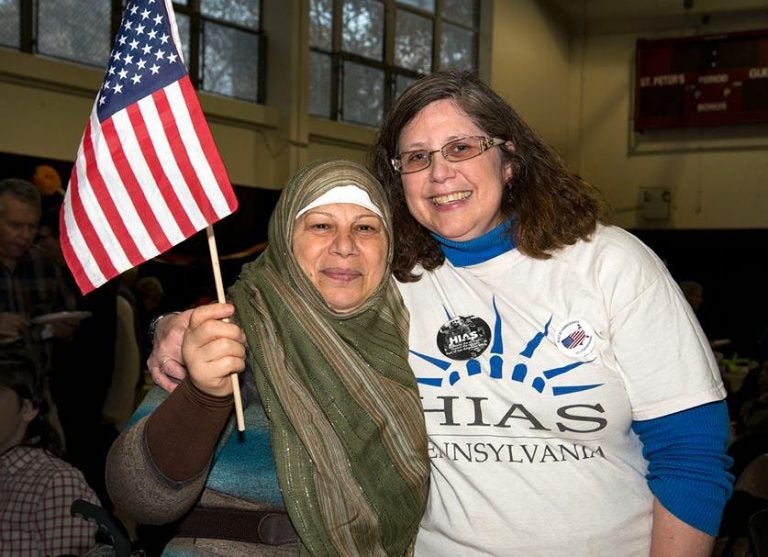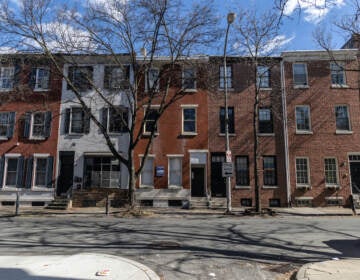How misinformation and fear keep Philly immigrants from accessing public benefits
Immigration pros from Community Legal Services and HIAS Pennsylvania clarify who is eligible for benefits such as a healthcare and SNAP.

HIAS Pennsylvania's 2018 Refugee Thanksgiving (Photo via facebook.com/HIASPennsylvania)
This story originally appeared on Generocity.
—
For low-income immigrant families in the United States, applying for basic assistance can be a grueling task.
The processes that undocumented families must follow can be confusing and at times can deter them from seeking assistance. Misinformation about who is qualified for certain benefits is a problem and can influence a fear of being deported.
“Immigrants of all statuses are really afraid, for a number of reasons,” said Maripat Pileggi, a staff attorney at Community Legal Services, a nonprofit with locations in both Center City and North Philadelphia; immigrants make up 14 percent of Philadelphians living in poverty. “When it comes to benefit access, what I have found is that immigrant families have fears [about] immigration policy that they believe are out in the world.”
“The law provides pretty robust privacy protection for people who are either applying for benefits for themselves or for eligible people in their family.” -Maripat Pileggi, Community Legal Services
One of the biggest fears: a lack of privacy, especially for “families that include undocumented people or people who feel that they are at risk of negative immigration consequences,” Pileggi said. Families are afraid, for instance, that when they submit an application for benefits their information about who they are and where they are living will be made accessible to federal immigration officials.
But even for an undocumented parent applying for food stamps or medical assistance for their child who is a U.S. citizen, information about who they are and where they are employed is protected. In 2013, United States Immigration and Customs Enforcement (ICE) clarified its policy stating that the agency does not use information provided on personal health care applications for immigration enforcement.
“[Undocumented immigrants] believe that there is no privacy available to them, but the law provides pretty robust privacy protection for people who are either applying for benefits for themselves or for eligible people in their family,” Pileggi said.
The fear of being of being deemed a “public charge,” which the National Immigration Law Center define as “a person who is considered primarily dependent on the government for subsistence,” also keeps the undocumented from applying for benefits across the United States.
“Public charge has been around for a very long time — it’s been an immigration law since the 1800s, literally,” she said. “What the law says is that immigration officials, when they are processing somebody’s application for a green card, they can deny that application if they find that this immigrant is public charge.”
In October, the Trump administration published its proposed expansion of the public charge rule: The change would include a new list of “negative factors” why someone might someday be deemed a public charge, including being older than 61 and having a low credit score, according to Forbes.
In other words, it could become easier than ever to be denied a green card.
“They could consider anyone who’s likely to use just regular old medical assistance for regular old healthcare, or anyone who’s likely to use food stamps in the future can be considered a public charge,” Pileggi said. “Under this proposal, anybody under 250 percent of the federal poverty line, which is two and a half times the poverty rate, [could be considered]. So these are really middle-income people.”
The proposed change would target benefit types such as medical assistance and food stamps, which Pileggi said is especially problematic because these programs are meant primarily for working families.
(The list of immigrants eligible to use Healthcare.gov’s Marketplace includes green card holders, some asylum seekers, battered spouses, refugees and more.)
“This regulation would make using public benefits like SNAP, non-emergency federal Medical Assistance, and affordable housing programs a disqualifier for immigration benefits like a green card,” said Miriam Enriquez, director for the City of Philadelphia Office of Immigrant Affairs, in an October statement.
The office published an action guide for public charge changes.
“There will certainly be a chilling effect of such a rule change,” Enriquez said. “Even immigrants not subject to the public charge test may be deterred from accessing necessary programs that help them and their families access health care, food and other essential needs. Immigrants and their children, many who are U.S. citizen children, are likely to forgo the benefits and assistance they are eligible for due to fear, confusion or an abundance of caution.”
“Even immigrants not subject to the public charge test may be deterred from accessing necessary programs that help them and their families access health care, food and other essential needs.” -Miriam Enriquez, Office of Immigrant Affairs
Current immigration laws make very few immigrants eligible for benefits — a common misconception, said Cathryn Miller-Wilson, executive director of immigrant services nonprofit HIAS Pennsylvania.
“One of the things that’s very frustrating about a lot of the headlines and stories around this is this kind of insistence that immigrants come here and take all of our public benefits, and that’s just false,” she said. “They can’t — if you are undocumented you are absolutely ineligible for any assistance at all.”
Another reason many wouldn’t apply in the first place: Undocumented immigrants don’t have any of the necessary paperwork — social security documents, tax documents — required to process an application for public assistance.
“One of the things that’s very frustrating about a lot of the headlines and stories around this is this kind of insistence that immigrants come here and take all of our public benefits, and that’s just false.” -Cathryn Miller-Wilson
Eligible immigrants may work with agencies such as HIAS to apply for benefits, which can be especially helpful for people in two categories: those who are new to the U.S. and haven’t yet found employment or don’t speak English, and those who have lived in the U.S. for a while but experience a hardship so that they suddenly need financial or other help, Miller-Wilson said.
“They need the temporary benefits … until they get back on their feet, which is usually fairly quickly,” Miller-Wilson said. “This is a population that for the most part came here with nothing and got a job within three months, so they’re they’re used to scrambling, but that public assistance in the gap can keep them from becoming homeless.”
Other categories include refugees and undocumented immigrants who become eligible and then become disabled or elderly. The latter are eligible for disability benefits or social security income benefits if they have a work history. However, if immigrants don’t become citizens within about seven years of becoming a permanent resident, they will lose those benefits.
In the past year, Miller-Wilson said, calls to HIAS from those seeking help accessing benefits had increased.
“The assistance that we provide has spiked, tremendously,” Miller-Wilson said. “We grew by 10 [staffers], and we have waiting lists. Our receptionist … can’t keep up with all the phone calls.”
And yet, she added: Since the announcement of the public charge rule, that number of calls has decreased dramatically.
 Generocity is one of 21 news organizations producing Broke in Philly, a collaborative reporting project on solutions to poverty and the city’s push toward economic justice.
Generocity is one of 21 news organizations producing Broke in Philly, a collaborative reporting project on solutions to poverty and the city’s push toward economic justice.
WHYY is your source for fact-based, in-depth journalism and information. As a nonprofit organization, we rely on financial support from readers like you. Please give today.




